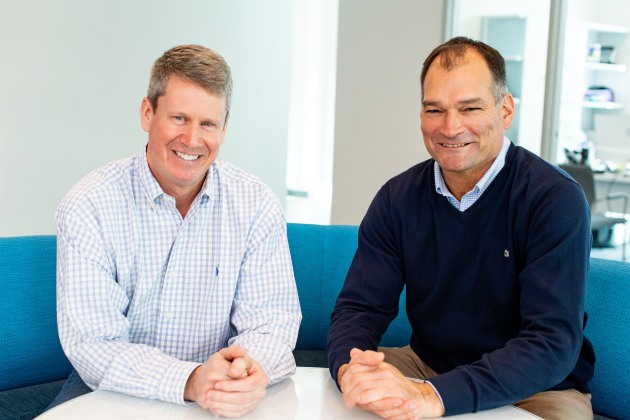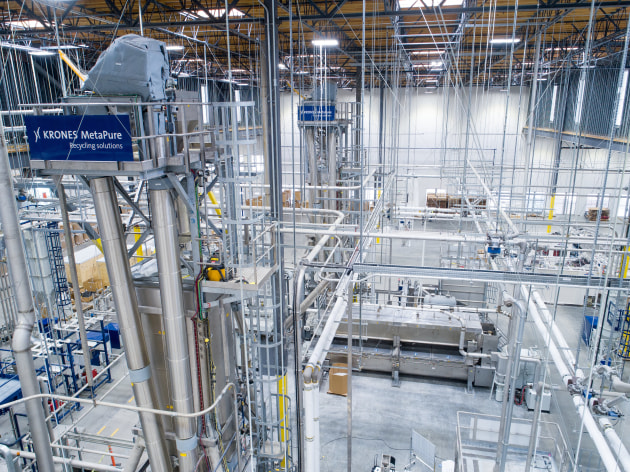Seeking to help create a world without plastic waste, the ambitious founders of US recycling startup rPlanet Earth have invested in a massive PET recycling line from Krones.
Bob Daviduk and Joe Ross are looking to make a dent in the amount of plastic that ends up in incinerators, landfills, or the environment every day. Daviduk points out that, of all the plastic created in the world, only nine per cent ever gets recycled.

“In terms of sustainability, the US is an emerging market. We recycle one in five bottles give or take. In Europe, it’s closer to five out of ten. In Germany, it’s over 90 per cent because of the deposit,” he says, adding that in the ten US states with container deposit schemes for PET and glass bottles and cans, collection rates have risen to an average of over 70 per cent – and as high as 92 per cent.
Having been in the plastics industry for more than 20 years, Ross says he – along with Daviduk – have recognised the market potential in recycled plastic.
“Unfortunately, most people don’t give any thought to what happens to plastic once it’s been used. So, our goal is to produce plastic packaging for a broad array of consumer packaged goods (CPG) companies and then be able to take that used plastic and turn it right back into the same product,” says Ross.
Daviduk adds that almost every CPG (or FMCG) company is desperate for recycled PET (rPET), but there isn’t enough material.
“The market is growing fast. A few years ago, most companies were satisfied if their preforms had 25 percent recycled content, and now many are saying they want 100 percent. Many brand owners see that as their contribution to protecting the environment and promoting sustainability,” he says.
To supply this voracious demand, Daviduk Googled a variety of equipment suppliers – and that is how he found Krones, which looked interesting to him.
“Six years ago, Krones wasn’t really known in the PET recycling field. But my business partner Joe and his brother were both in the packaging industry and, of course, knew Krones. So I called – and was immediately put in touch with the right people; first in Neutraubling, then here in their Franklin, Wisconsin office,” he says.

rPlanet Earth’s new 28,000 square metre plant in Vernon, California, is divided into three sections. In the first section, feedstock is debaled, sorted, and shredded; then the resulting flake enters a Krones MetaPure W wash line in the second section, which removes remaining contaminants before a second sorter ensures only PET flakes make it to the next stage; and finally, the third section uses a MetaPure S decontamination reactor to heat the flake to up to 200 degrees Celsius, making it suitable for direct food contact packaging.
The flake then skips the standard pelletising step, thus saving time and energy, and is instead sent directly to one of the plant’s plastics processing lines, where it is made into preforms or extruded sheet. The process by which the still-hot flake is turned into product in three sheet extrusion and two injection moulding machines was developed by rPlanet Earth in conjunction with Krones, and reduces the amount of time the PET is heated, thus improving material quality and energy efficiency.
This complex and compact closed loop is what sets rPlanet Earth apart, says Daviduk.
“The setup was important for us for a couple of reasons. One is because, as far as we know, it gives us the lowest carbon footprint for packaging worldwide.
“Another is that it just made sense for us to have everything under a single roof because it’s a more efficient process. At rPlanet Earth, our goal is to have the lightest possible impact on the environment, on our planet Earth,” he says.
Once the plant comes online this year, Ross and Daviduk aren’t planning to rest on their laurels: they are already looking to build a second rPET line right next to the first, making the Vernon plant the world’s largest PET recycling plant of its kind. They also plan to open three or four more plants in high-population-density regions around the US, which will collect large amounts of post-consumer PET and put them close to end customers.
“We’ll keep Krones busy. It will be really exciting for all of us,” says Daviduk.






